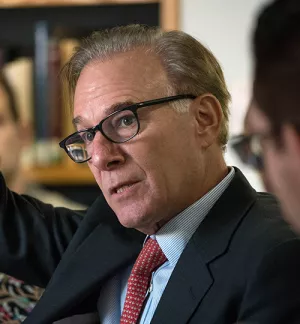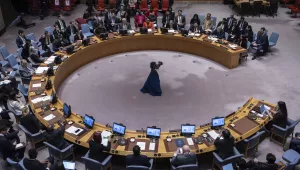Bassem Youssef, Egypt’s popular television comedian, expresses the irreverent confidence this country will need to regain stability. On air, he mocks the autocratic tendencies of both the Muslim Brotherhood leaders and the army generals who toppled them from power.
Gen. Abdel Fatah al-Sissi and his adoring supporters unfortunately seem to have lost the celebrated Egyptian sense of humor. Youssef presented a hilarious episode on Oct. 25 that showed footage of Sissi admonishing the nation. Then a muscular hand emerged from under the table and placed a new script before Youssef. After he shouted the Arabic word for “freedom,” the anonymous hand dove for his groin and began squeezing.
Youssef’s next show was pulled from the air, and last week an Egyptian prosecutor referred 30 complaints to a judge for investigation. It was a chilling response. But more than that, it was stupid: It made Sissi’s government look petty and dictatorial.
I came away from a visit here convinced that Egypt can find its way to civilian democracy — but only if officials lighten up and create the more tolerant, robust country that was envisioned by the Tahrir Square revolution that overthrew Hosni Mubarak.If Sissi decides to run for president next year, he would almost certainly win. But that would retard Egypt’s political development.
The United States, after months of confusing stop-go policy toward Egypt, may finally be moving to help its long-standing ally find some balance. The State Department is forming a team to work with the United Arab Emirates, and perhaps Saudi Arabia, to support the Egyptian economy and smooth the political transition.
U.S. policy over the past year had managed to offend nearly everyone here. The United States was seen as too supportive of President Mohamed Morsi during his year in power. When the military intervened, some Islamists thought (wrongly) that the United States was complicit in the bloody crackdown. U.S. attempts to punish the regime by cutting military and economic assistance further angered people.
Unfortunately, high-level confusion in U.S. policy appears to be continuing, with Secretary of State John F. Kerry supporting more assistance for Egypt and national security adviser Susan Rice resisting what might appear to be support for the military coup. The United States can’t afford such policy disarray.
“You can’t act as if this regime didn’t kill a thousand people in one day. You need accountability,” said Hossam Bahgat, one of Egypt’s leading human rights activists.
But that accountability must come from Egyptians, not Americans. “The country goes down the drain, and the U.S. responds with its usual policy of ‘managing the crisis.’ That sends the wrong message,” complained Amr Moussa, a former foreign minister. “If the crisis has to be managed, it should be managed by us. We don’t want a lose-lose situation here like Syria or Iraq.”
Moussa is heading a 50-person commission that is writing a new constitution for Egypt as part of its road map back to democracy. The plan calls for the constitution to be completed in December and for a public referendum in January. Parliamentary elections would follow in the spring and presidential elections in the summer.
But this constitutional framework may have the regrettable effect of legitimizing military rule, should Sissi decide to seek the presidency — following in the path of officers-turned-presidents Gamal Abdel Nasser, Anwar Sadat and Mubarak. “We don’t want a new pharaoh,” said Bahgat. Many Egyptians share this wariness of another military leader.
Egypt’s political problem is that the secular parties haven’t generated a popular leader as an alternative to Sissi. “Three years of revolution have not produced one person who can speak for the revolution,” said Hani Shukrallah, the former editor of Al-Ahram Online and a vocal critic of both Mubarak and Morsi.
“We haven’t found that macho, elegant young man who is a secularist,” says Nabil Fahmy, the foreign minister, noting the lack of a strong civilian candidate. He argues that the reformed political process must include the Muslim Brotherhood’s Freedom and Justice Party if it is to have legitimacy.
Westerners should take hope, as Egyptians do, from the fact that most people here decided they didn’t want to live in the rigid Muslim society that the Brotherhood was creating. When Morsi suspended the constitution last November, the United States was slow to react; it was too supportive of the new Islamist regime. That still grates with Egyptians.
A slogan among Egyptians these days is “Ayzeen ne’aish,” which loosely translates as “We just want to live.” But this understates the desire for change that’s still evident when Egyptians talk about their “revolutions” — first against Mubarak and then against Morsi. People want to live, yes — but with the freedom and dignity the revolutions promised.
The U.S. policy tilt back toward Egypt, as urged by Kerry, makes sense, especially if it aligns the United States with the narrative of change that began in 2011 in Tahrir Square.
Ignatius, David. “Egypt Looks For A Path Toward Democracy.” The Washington Post, November 20, 2013




